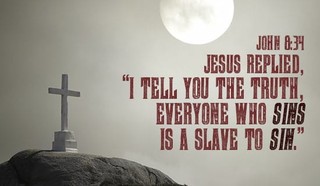
- Recent Translations
- All Translations
John 8:35
Share
Settings
John 8:35 Meaning and Commentary
And the servant abideth not in the house for ever
The servant of God, and of Christ, does, but not the servant of sin: there may be servants of sin in the house or church of God here below; and such were these Jews Christ is speaking to; but such shall not abide there for ever: some that get into this house are quickly discerned, as Simon Magus was, and are soon removed; and others that may stay longer, are sometimes suffered to fall into some foul sin, or into some gross error and heresy, for which they are cast out of the house or church of God, according to the rules of God's word; others make parties, draw disciples after them, and separate themselves, and go out of their own accord, to serve their own purposes: and others, when persecution and tribulation arise because of the word, they are offended and gone; this is the fan with which Christ sometimes winnows his floor, and removes the chaff; and those that continue longest, even to the end of their days, or of the world, or the second coming of Christ, as the foolish virgins, will then be discerned and separated; for the ungodly shall not stand in judgment, nor sinners in the congregation of the righteous; they shall not enter into the house above, into the house not made with hands, eternal in the heavens, which is Christ's Father's house: none but sons are brought to glory; these are the only heirs of salvation; others will be bid to depart, as workers of iniquity, as the servants of sin; even such who have made a profession of religion, and have been, and have had a standing in the house of God below. The allusion is to the case of servants in common; and, in a literal sense, it is true both of good and bad servants: good servants do not always continue in their master's house; even an Hebrew servant, that loved his master, and would not go out free at the end of his servitude; and who, after having his ear bored, is said to serve him for ever, ( Exodus 21:6 ) ; yet that "for ever" was but until the year of jubilee, whether near or remote, as the Jewish commentators F4 in general explain it; nay, if his master died before that time, he went out free: he was not obliged to serve his son or heirs; and so say the Misnic doctors F5:
``one that is bored is obtained by boring, and he possesses himself (or becomes free) by the year of jubilee, and by the death of his master.''And to this agrees what Maimonides F6 says;
``he that has served six years, and will not go out, lo, this is bored, and he serves until the year of jubilee, or until his master dies; and although he leaves a son, he that is bored does not serve the son; which may be learned from the letter of the words, "he shall serve him", not his son, "for ever", until the jubilee: from whence it appears, that he that is bored does not possess himself (or is free) but by the jubilee, and by the death of his master.''And one of their writers F7 observes, that the word rendered, "shall serve him", is by Gematry, and not his son. And among the Romans, good servants were oftentimes made free, and bad ones were turned out, and put into a work house, to grind corn in mills, a sort of bridewell; and such evil servants may more especially be respected, since Christ is speaking of servants of sin:
but the Son abideth ever:
the Son of God, the only begotten Son of God the Lord Jesus Christ will always continue as a Son in his own house, as the Lord and proprietor of it; and as an high priest over it, having an unchangeable priesthood; and as he that takes care of it, provides for it, and manages all the affairs thereof, the family in heaven and in earth being named of him. And as he, so all the adopted sons of God shall continue, being pillars in this house, that shall never go out: such are no more servants, nor foreigners, but fellow citizens with the saints and of the household of God; and being sons, are heirs and shall never be cast out, as the bondwoman and her son have been: but these being the children of the free, shall for ever enjoy the inheritance they are adopted to; once sons, always so; the relation ever continues; they will ever remain in the family, and being entitled to the heavenly estate, shall ever possess it.
F4 Jarchi, Aben Ezra, & ben Gersom in Exod. xxi. 6.
F5 Misn. Kiddushin, c. 1. sect. 1.
F6 Hilchot Abadim, c. 3. sect. 6, 7.
F7 Baal Hatturim in Exod. xxi. 6.

